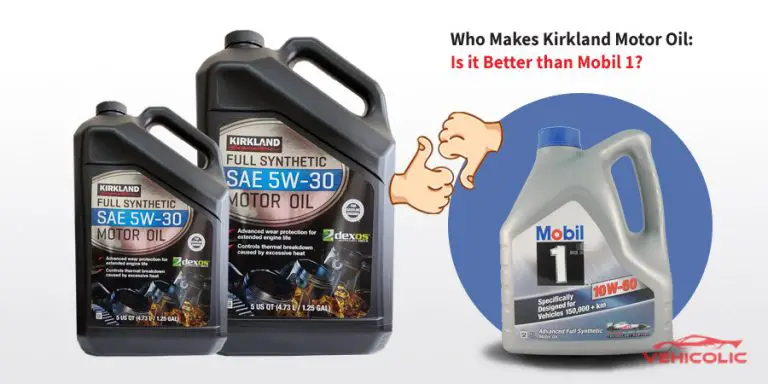0w20 vs 5w20: Which is Best for My Car?
Let’s face it, most of us are clueless when it comes to motor oil. We know we need it and have to change it, but when it comes to choosing the right type, our brains turn into mush. That’s where we come in, folks.
Selecting the right oil for your vehicle can be challenging, especially if you’re not a car expert. If you’re stuck between 0W20 vs 5W20 oils, don’t worry.
This article will help you make an informed decision and avoid confusion.
Motor oil is not just some lubricant that keeps your engine from grinding to a halt. It’s the lifeblood of your vehicle, keeping everything running smoothly and ensuring that you don’t get stranded on the roadside, cursing your luck and wondering why you didn’t just take the bus.
So, without further ado, let’s compare and find out which motor oil is best for your car’s engine.
What are 0W20 and 5W20 oils?
If you’re conversant with motor oil, you’ve likely come across the terms 0W20 and 5W20. These alphanumeric letters may initially seem confusing, but they represent the oil’s viscosity rating.
Viscosity refers to how freely the oil flows, with lower numbers indicating a thinner, more easily flowing oil.
First, let’s take a closer look at 0W20 oil. The “0W” refers to the oil’s viscosity rating. In simple terms, viscosity measures how easily oil flows through your engine.
The lower the number, the thinner the oil, and the easier it flows. 0W20 oil is a thin oil specifically designed to work in low-temperature conditions. This means it’s perfect for drivers who live in colder climates.
Now, let’s move on to 5W20 oil. Similar to 0W20, the “5W” refers to the viscosity rating, but it’s slightly thicker than 0W20. The higher number means it’s slightly thicker, which makes it more suitable for warmer temperatures. However, it’s still a thin oil and can be used in many vehicles.
0w20 vs 5w20: Viscosity Grade
Viscosity grade is a critical factor when choosing the right motor oil for your car. The Society of Automotive Engineers (SAE) has set standards for viscosity grades, with two numbers separated by a “W” indicating the oil’s winter viscosity rating.
Starting with 0W20, this oil has a thinner viscosity than 5W20, which flows more easily at cold temperatures. This makes it a good choice for drivers living in colder climates or frequently starting their car in chilly weather.
However, it’s important to note that 0W20 oil is not ideal for high-performance engines, as it may not provide enough protection under high-stress conditions.
5W20 has a slightly thicker viscosity than 0W20, making it more suitable for warmer climates or engines that frequently run at high temperatures.
While it may not flow as easily in cold weather, it still provides adequate protection for most engines, including high-performance models.
Which one is better in terms of viscosity grade? The answer depends on your driving habits and the climate you live in. If you frequently drive in cold weather, 0W20 may be your better choice.
On the other hand, if you live in a warmer climate or own a high-performance engine, 5W20 may be the better option.
0w20 vs 5w20: Temperature Range
Temperature range is one of the most critical factors when selecting the right oil for your car. It refers to the range of temperatures that an oil can perform effectively without breaking down or causing damage to the engine.
Firstly, let’s take a look at 0W20 oil. This type of oil is designed for use in colder temperatures and can perform effectively in temperatures as low as -40°C. This makes it a perfect choice for drivers in colder climates, as it provides better engine protection during startup.
However, it’s important to note that 0W20 oil may not be suitable for high-temperature environments, as it may break down more quickly under extreme heat.
On the other hand, 5W20 oil is formulated for use in a wider range of temperatures. It can perform effectively in temperatures as low as -30°C and as high as 40°C.
This makes it a flexible choice for drivers living in regions with fluctuating temperature ranges.
Both 0W20 and 5W20 oils have their respective strengths regarding the temperature range. If you live in a colder climate, 0W20 oil may be the better choice for your car.
However, suppose you frequently drive in fluctuating temperature ranges or hot conditions. In that case, 5W20 oil may be a more versatile and effective option for your vehicle.
0w20 vs 5w20: Engine protection
Your vehicle’s engine is its heart and soul; without proper lubrication, it won’t run smoothly. That’s where 0W20 and 5W20 oils come in – both offer excellent engine protection, but which is better for your car?
Let’s start with 0W20 oil. This type of oil is designed to provide maximum engine protection in cold temperatures. The “0” in the name indicates a low viscosity, which means it flows more easily at low temperatures. This is crucial for ensuring the engine is properly lubricated even in extremely cold weather.
In addition, 0W20 oil is also formulated to provide excellent protection against engine wear and tear, which can extend the life of your engine.
Now, let’s take a look at 5W20 oil. Like 0W20, it is designed to provide excellent engine protection but with a slightly higher viscosity rating.
This means it may be better suited for use in warmer climates where the oil doesn’t need to flow quite as easily. 5W20 oil is also formulated to provide superior engine wear protection, helping to keep your engine running smoothly for years to come.
0w20 vs 5w20: Pricing
When it comes to pricing, there is not a significant difference between 0W20 and 5W20 motor oils. In general, both oils are priced similarly, and their cost depends on the brand and location of purchase.
However, it is worth noting that some high-performance 0W20 synthetic oils can be more expensive than standard 5W20 oils. If pricing is your primary concern, either oil would be a good choice.
Quick Comparison Table
| Parameters | 0W20 | 5W20 |
|---|---|---|
| Fuel Efficiency | Better | Good |
| Viscosity | Thinner | Thicker |
| Temperature Range | Better | Good |
| Pricing | Similar | Similar |
| Engine Protection | Better | Good |
| Compatibility | Fewer vehicles | More vehicles |
The exact performance of each oil will depend on the specific brand and formulation. However, in general, 0W20 oils tend to offer better fuel efficiency and better engine protection and are better suited for extreme temperature ranges.
On the other hand, 5W20 oils are thicker and may be more compatible with a wider range of vehicles.
Which oil Should You Use?
To guarantee your car’s best performance and protection, selecting the appropriate oil grade based on your region’s climate is crucial.
The most recommended multi-grade oils for most climates are SAE 0W-20 and 5W-20, but in extremely cold temperatures, 5W-30 is a better option.
However, choosing the right oil weight can be complex, as the owner’s manual recommends an oil viscosity and grade. Using too viscous oil can cause metal-on-metal movement restrictions and hinder necessary oil circulation, leading to engine wear, overheating, and reduced power and efficiency.
On the other hand, using too thin oil can cause insufficient engine lubrication, resulting in reduced power and efficiency and problems with cold-weather starts.
Choose the appropriate oil weight to avoid engine issues and ensure your car’s optimal performance.
FAQs
Is 5W-20 better than 0W-20?
Both oils show similar results when it comes to fuel economy and mileage. Nevertheless, because of its low viscosity and thinner oil flow, 0W-20 oil might have an edge in providing better fuel efficiency and reducing carbon emissions slightly.
What happens if I use 5W20 instead of 0w20?
There may be no significant impact on performance if you use 5W20 instead of 0W20. Both types of oil are formulated to have a similar viscosity in colder temperatures. Therefore, the choice between 5W20 and 0W20 may not significantly affect the engine’s performance.
Can I mix 0w20 with 5W20?
Mixing 0W20 and 5W20 oils will have negligible effects that are not noticeable or measurable. Although there might be a slight difference in viscosity at extremely low temperatures, blending these oils will not serve any purpose. Additionally, all 0W oils are synthetic.
Final words
Choosing between 0W20 and 5W20 oils can be a daunting task for non-experts. Still, it is a critical decision that can impact the performance and lifespan of your engine.
Both oils have their strengths and weaknesses, and the best option depends on your driving habits and the climate you live in.
Ultimately, consult your vehicle’s owner’s manual or a trusted mechanic for the best advice on which oil is ideal for your engine.



